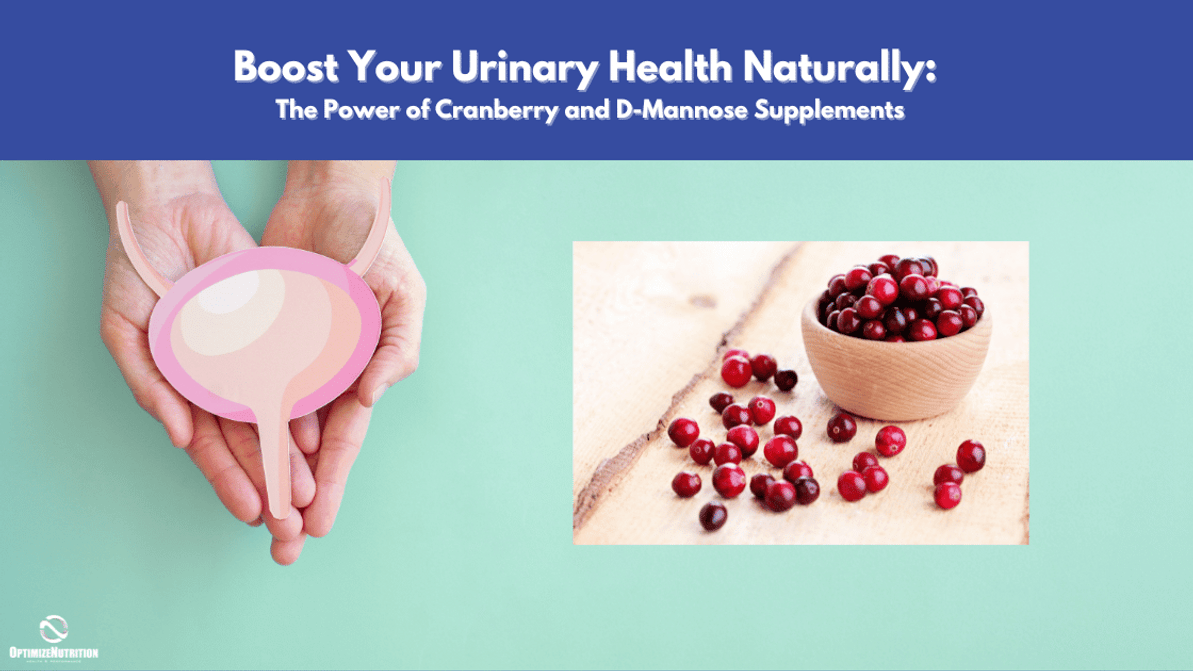Boost Your Urinary Health Naturally: The Power of Cranberry and D-Mannose Supplements
Cranberry and mannose are natural supplements often used together to promote urinary tract health. Both have unique properties that can help in preventing and managing urinary tract infections (UTIs). Here's a closer look at each:
Cranberry
Source: Cranberry is a small, tart, red berry from the Vaccinium macrocarpon plant, commonly consumed in various forms like juice, capsules, or dried fruit.
Benefits:
- Prevention of UTIs: Cranberries contain proanthocyanidins (PACs), compounds that prevent bacteria, particularly Escherichia coli (E. coli), from adhering to the urinary tract walls. This anti-adhesion property helps reduce the risk of infections, and support bladder health.
- Antioxidant Properties: Cranberries are rich in antioxidants like vitamin C, flavonoids, and phenolic acids, which help neutralize harmful free radicals and reduce inflammation.
- Heart Health: Regular consumption may improve cardiovascular health by reducing blood pressure, improving lipid profiles, and enhancing vascular function.
- Dental Health: Cranberry compounds may also prevent bacteria from adhering to teeth, thus reducing the risk of gum disease and cavities.
Forms of Consumption:
- Juice: Often sweetened to balance the tartness, but it can be high in sugar.
- Capsules/Tablets: Concentrated forms without added sugar.
- Dried Cranberries: Convenient for snacking, but usually contain added sugars.
- Powder: Can be added to smoothies or foods.
D-Mannose
Source: D-mannose is a type of sugar related to glucose. It's found naturally in some fruits, including cranberries, apples, and oranges, but it can also be synthesized for supplements.
Benefits:
- UTI Prevention and Treatment: Like cranberry, D-mannose helps prevent E. coli bacteria from sticking to the walls of the urinary tract. This sugar can be excreted through urine, where it binds to the bacteria and helps flush them out.
- Gentle on the Body: Unlike antibiotics, D-mannose does not disrupt the balance of beneficial bacteria in the gut or urinary tract, making it a preferred option for recurrent UTIs.
Forms of Consumption:
- Powder: Often mixed with water or juice for easy consumption.
- Capsules/Tablets: Convenient and easy to take with controlled dosages.
Combined Use
When used together, cranberry and D-mannose can provide a synergistic effect in maintaining urinary tract health. Cranberry's PACs prevent bacteria from adhering to the urinary tract, while D-mannose helps remove them through urine. This combination is popular for those prone to frequent UTIs.
Considerations
- Dosage and Timing: It's important to follow recommended dosages and consult with a healthcare provider, especially for chronic conditions.
- Potential Side Effects: Cranberry products can sometimes cause stomach upset or increase the risk of kidney stones due to their high oxalate content. D-mannose is generally well-tolerated but can cause bloating or diarrhea in some people.
- Not a Replacement for Antibiotics: While these supplements can help prevent UTIs, they should not replace antibiotics in treating active infections unless advised by a healthcare provider.
Conclusion
Cranberry and D-mannose are widely used for their natural ability to support urinary tract health. Their effectiveness, particularly in preventing UTIs, makes them a valuable addition to a holistic approach to wellness. As always, consulting with a healthcare professional before starting any new supplement regimen is advisable.
Recent Posts
-
Beat the Winter Blues: A Nutritionist’s Guide to Managing Seasonal Affective Disorder Naturally
As the days get shorter and temperatures drop, many people notice changes in mood, energy, sleep, an …Dec 12, 2025 -
Back to School: Sharpen Focus, Energize Learning
As the school season kicks off, it’s the perfect time to set students up for success—not just with s …Sep 02, 2025 -
Is Apple Cider Vinegar Really Good for You?
Exploring the Benefits of ACV (Featuring Filsingers Organic Apple Cider Vinegar & Suku Vitamins Appl …Jul 18, 2025




